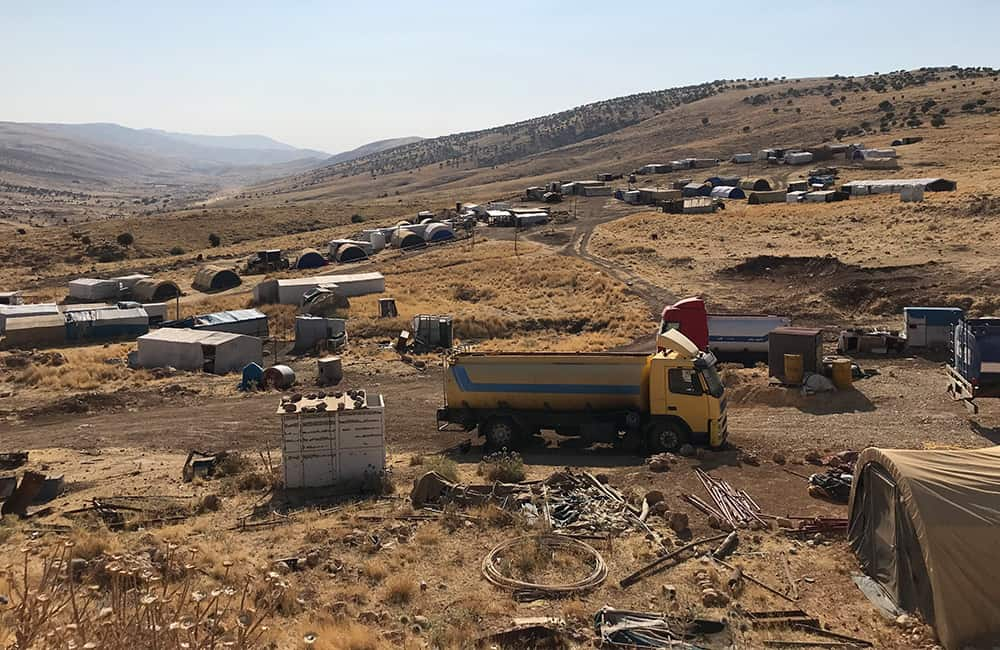We are also providing families with cash grants, to empower them to prioritise their most urgent and specific needs. I’ve seen first-hand how families are using the cash grants differently; some families have started savings groups, others opened a new business, some purchased urgent medication for their children, and others rebuilt damaged houses.
Life in the Camps
Just like anywhere in the world, the family home is important in Iraq. Before conflict ravaged entire governorates, it was common to see several generations living together in a single house.
The communities that the Building Peaceful Futures project support are largely rural; peppered with large homesteads and farmhouses. Before the destruction across both Sinjar and Hawija, several big families would live together on one property. Now the vast majority of families live in displaced persons camps, where the walls dividing them are sheets of polyethylene, giving them shelter from the rain, but little else.

A displacement camp in Sinja, Iraq.
Image: Georgia Tacey/Save the Children
The lack of space and privacy is leading to a deterioration of the social fabric of displaced communities living in camps. Families and neighbours that once got along well are now at odds with each other after spending years living in terrible conditions. There is no privacy for women’s daily hygiene practices or marital relationships, and the pressure this lack of privacy puts on marriages and parents directly correlates with a spike in domestic violence.
Moving Past Grief
Another crucial program of Building Peaceful Futures is the establishment of community committees. These committees ensure that different ethnic backgrounds are around the table solving local issues together with an aim to build social cohesion, but also addressing problems and resource issues in the community as they try to rebuild.
From her tent inside a displaced persons camp, I spoke with Noor*, who described the destruction her town endured, and how she lost her sons in the conflict. She was explaining to me why it was so important for her to be a part of this neighbourhood committee to be able to contribute, to heal and to get her community back on the road to recovery.
It was only after I had been speaking with her for 45 minutes that she disclosed that she was stolen by IS for over 12 months. When IS invaded her village, she and her daughters tried to flee, but her youngest daughter who has cerebral palsy, didn’t know what was going on, and her panicked crying drew attention to them.
For over a year, Noor was held captive. Each day she was viciously sexually assaulted by several men. She eventually escaped, but her daughter, who was kept in a different room from Noor, did not. Tragically Noor has not seen her daughter since that day. She told me that aside from the heartbreak, she is also suffering physical pain, but shame has prevented her from seeing a doctor.
As she was relaying the recent horrors she’d lived through, I wondered how she was even able to continue breathing. Yet in spite of her anguish, there she was, talking to me about the action items of the neighbourhood committee. It became clear to me how important it was to Noor – and so many women like her – to keep working on rebuilding her community, in order to put the heartbreak of the past behind her. Putting one foot in front of another.
Looking Ahead
We are all concerned about the rapid spread of coronavirus, and what it might mean for our families and for our home. But when I witness women like Noor who battle grief and trauma every day, yet are gallantly striving to rebuild their lives, I am dispirited to read stories about woman in Woolworths fighting over toilet paper.
As this virus spreads, we Australians are preparing for the world to change and making plans to mitigate its impact on our lives. But we must not forget the families that cannot make such plans. As without homes, roads, electricity, clean water, livelihoods and functioning communities, they have very little to keep them safe. Families in Iraq living in displacement camps don’t have that luxury of knowing when they will be able to return to ‘normal life’. The Coronavirus is just the latest in a serious of crisis that these resilient families have to face.
Australians must consciously remember the people around the world whose lives have been torn apart by war.
Don’t just look inward during these strange and uncertain times.
Look up.
Georgia Tacey is the Director of the Building Peaceful Futures consortium in Iraq.
 Building Peaceful Futures is supported by the Australian Government and implemented by Save the Children, the Norwegian Refugee Council, Humanity and Inclusion, and Care International.
Building Peaceful Futures is supported by the Australian Government and implemented by Save the Children, the Norwegian Refugee Council, Humanity and Inclusion, and Care International.